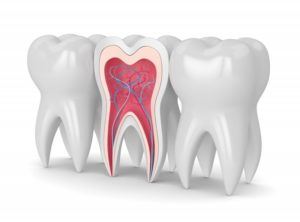
Are your teeth sensitive to hot and cold? Do they stay yellow even after teeth whitening treatments? If so, you may have tooth enamel loss. The erosions of your enamel can cause serious problems down the road, including increased sensitivity. But what exactly is enamel? What does it do? A dentist in downtown Portland is here to answer these questions.
What is Tooth Enamel?
Enamel is the material on the outside, visible part of your teeth. It is the hardest surface in your body and is even stronger than bone. It’s made up primarily of minerals, mainly hydroxyapatite. Because of its strength, it does an excellent job of protecting the inner layers of the tooth. However, everyday acids from certain foods and drinks can put your enamel at risk for erosion. Allowing plaque to build up in your mouth can attract bacteria that weaken and destroy enamel over time.
Why Is Enamel Important?
Enamel plays an important role in shielding the inside of your tooth from decay. It also protects the inner layer of the tooth from becoming sensitive to extremely hot or cold temperatures. If your enamel is worn down or destroyed, it cannot regenerate, because it contains no living cells. Therefore, it’s important to protect the enamel that you have.
How Can I Protect My Enamel?
There are a few ways to prevent damage to your enamel in downtown Portland:
- Limit sugary and acidic foods. Acidic foods and drinks can wear down enamel. Sugary foods and drinks can attract more bacteria, particularly if you don’t brush and floss after ingesting all that sugar. Having more bacteria means a higher chance of tooth decay that can hurt your enamel.
- Avoid very hard foods. Chewing on hard candy or ice cubes can make your enamel crack or chip. Suck on candy and ice cubes instead.
- Brush and floss every day. Good oral hygiene habits can prevent bacteria from building up and causing decay.
- Visit your dentist at least twice a year. Your dentist can let you know the state of your enamel and provide tips for protecting it.
What Are the Signs of Enamel Erosion?
If you experience any of these symptoms, your enamel may be partially eroded:
- Color. If your teeth appear yellow, you may have lost a layer of enamel.
- Sensitivity. If your teeth are sensitive to hot, cold, or sweet foods and beverages, the sensitive inner layer of your tooth may be exposed.
- Roughness. If your teeth are a bit rough around the edges, that may indicate early stages of enamel loss.
Talk to your dentist in downtown Portland if you have any of those symptoms. Since tooth enamel cannot grow back, it’s important to take care of the enamel you’ve got.
About the Author
Dr. Megan McInnis is a member of the Oregon Dental Association and the American Dental Association. She enjoys staying up to date with the latest topics in dentistry so she can provide the best care possible to her patients in the Portland, OR area. She believes that regular checkups and cleanings are the best way to preserve your enamel. To learn more about how to preserve your teeth, click here or call (503)-761-1414.




